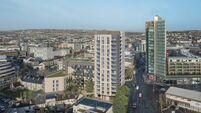Protesters from 'People’s Republic of Knocknagoshel' object to Eir mast at An Bord Pleanála HQ

Protest organiser Michelle Keane with over 25 Knocknagoshel residents, delivering her letter of objection Bord Pleanála HQ in Dublin. Picture: Tony Gavin
It was a cold spring morning on Dublin’s Marlborough Street, but spirits were high among the people who had arrived from Knocknagoshel.
They’d left the Kerry village before dawn to get to Dublin just after 11am, for a protest date at the offices of An Bord Pleanála, the State’s planning authority.
















